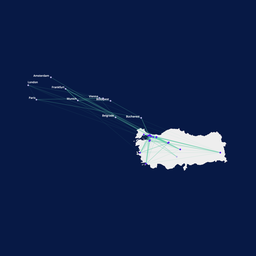We've updated the RIPE Atlas APIs - and there's a comprehensive new manual to explain how to use them. As a result, the current (version 1) APIs are still available for now, but will be deprecated by the end of the year.
The New APIs
The RIPE Atlas APIs (v1) have been around in some shape or form since the beginning of the project in 2010. A lot has changed since, both in terms of the tools we used to build the system, and the amount and complexity of the code. We've reached a point where it's more useful to revamp our APIs than maintain the original version, which is why we've developed a new version of the APIs (v2) using semantic versioning.
At the same time, we took this opportunity to provide a new, comprehensive manual to help explain how to use them, including:
- Different resource types, query parameters and fields
- Authentication, authorisation and API keys
- Creating and stopping measurements
- Tips, tricks and examples
The manual is available on the RIPE Atlas website under Documentation .
The v2 APIs will remain in beta status until the end of May. Please get in touch if you find any bugs or have any issues.
Deprecating the Old APIs
The v1 APIs are still available for the time being, but we plan on deprecating them by the end of the year. That means that you have lots of time to update any tools or scripts you might have that use them. We will send an announcement to the RIPE Atlas mailing list before we deprecate the v1 APIs.
Other Available Tools
As you may already know, the RIPE NCC has published a variety of tools to interact with the RIPE Atlas system, including a parsing library and a Python client. If you're using these tools and wrappers, then you don't need to worry about API version changes.
- The parsing library (called Sagan) can be used in combination with the latest measurement results API as well as the regular measurement results API. This handy library contains a number of parsers that can be used to extract only the relevant data from the full raw data file returned by the API.
- The Python client (called Cousteau) implements Python bindings for the RIPE Atlas API. It can create RIPE Atlas measurements, change the probes of an existing measurement, stop a measurement and fetch its results via HTTP or WebSocket streaming.
Feedback
As always, we want to know what you think of RIPE Atlas and our latest developments. We also want to know if you have an interesting use case for RIPE Atlas data that you'd like to share. Here's how to get in touch:
- Leave a comment about this specific article below
- Subscribe to the RIPE Atlas mailing list for discussions with active users and RIPE Atlas developers: ripe-atlas [at] ripe [dot] net
- If you want to report a bug or problem: atlas [at] ripe [dot] net





Comments 0
The comments section is closed for articles published more than a year ago. If you'd like to inform us of any issues, please contact us.